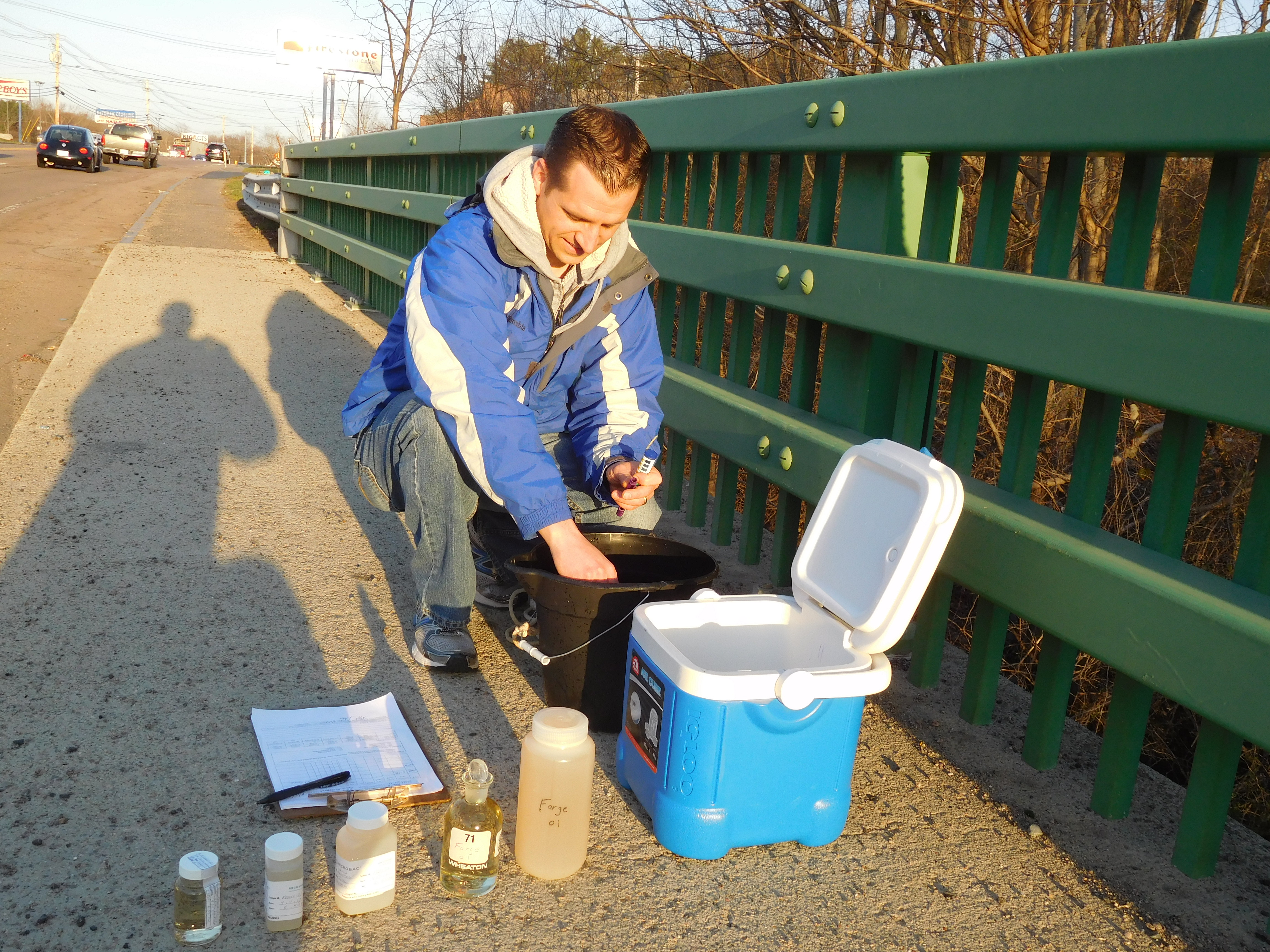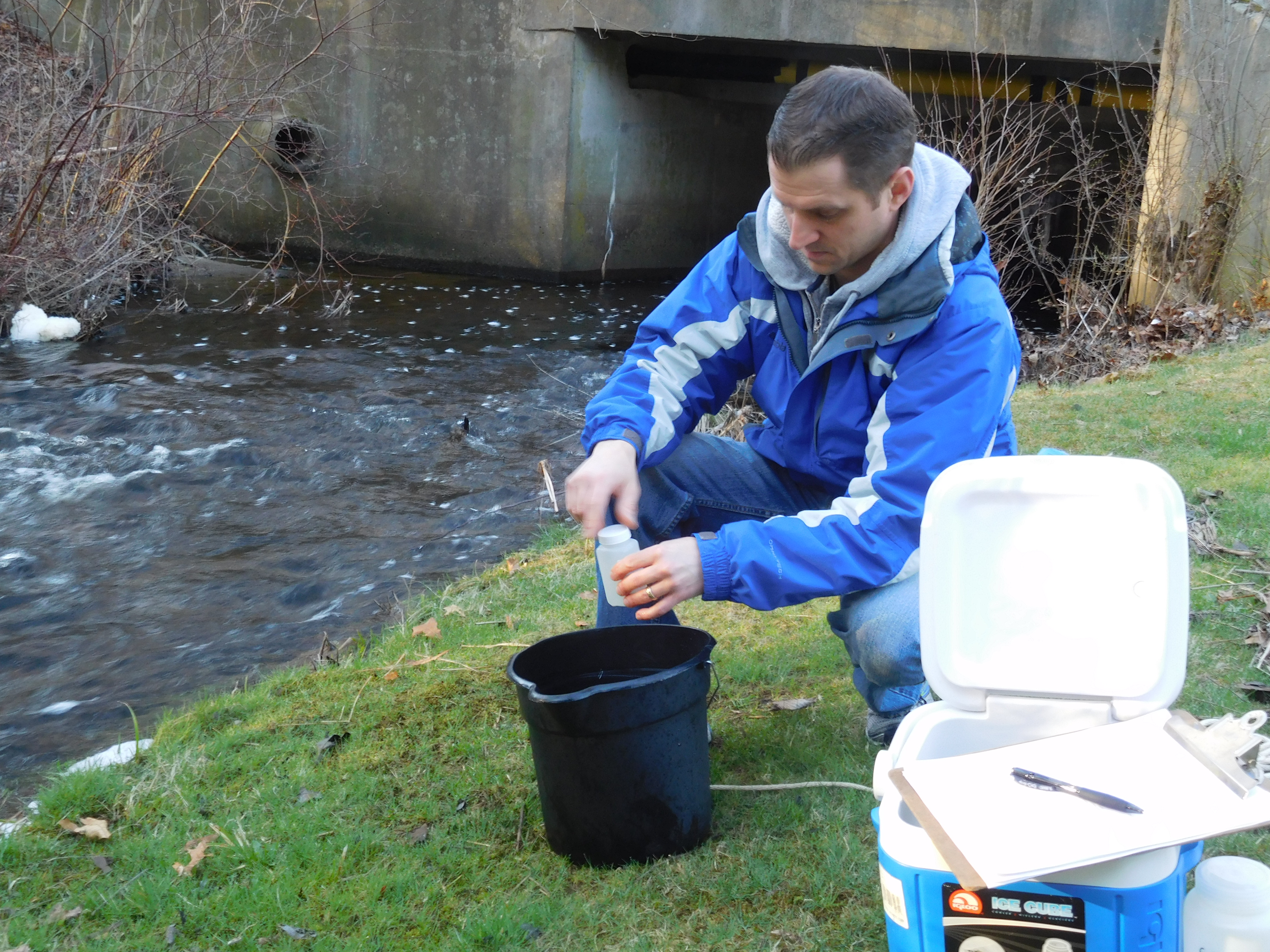In June 2017, Mass Audubon and the Taunton River Watershed Alliance released Stream Continuity Assessment in the Taunton Watershed a report detailing the findings of more than 500 stream crossing assessments in the Taunton River watershed. The River and Stream Continuity Project was a joint effort of the University of Massachusetts, the Massachusetts Division of Ecological Restoration, the Nature Conservancy and American Rivers. The Project developed a system to assess stream crossings and determine the extent to which each one created a barrier to aquatic passage and natural water flow. The database generated an “Aquatic Score” that represented the degree to which that crossing creates a barrier. Crossings were ranked as “severe,” “significant,” “moderate,” “minor” or “insignificant” barriers to passage. The report with its three Appendices are available on the Mass Audubon website.
Author: Stephen Silva
Teen Catches State Record Bowfin in Taunton River
Sixteen-year-old Tauri Adamczyk of Taunton caught a 7 pound, 14 ounce, 26.5 inches long Bowfin on July 23 in the Taunton River claiming the state record for this species. This species was added to MassWildlife’s state record keeping program which covers 23 fish species two years ago. See photo on MassWildlife website
Angler Education Day
On July 16th, TRWA, the Mass Wildlife Angler Education Program, and the MA Department of Conservation and Recreation teamed up to create a day of local cultural and natural history. Dozens of Dighton Rock State Park visitors learned about Taunton River biodiversity, explored the Dighton Rock Museum, and got a fishing lesson (and loaner tackle if needed) while enjoying a beautiful day along the river.
July Sampling Results In
The July sampling results are in and available at the Water Quality Monitoring Tab above (click on the sample bottles picture on the monitoring program home page). While not as bad as last year’s dry year we are seeing nitrate values 2 to 3 times the water quality target value of 0.4 mg/l. This underscores the need for wastewater treatment plants to continue with their programs to upgrade the plants to remove nitrogen and for municipalities, state agencies, and the public to identify ways to control nonpoint (a.k.a. non-wastewater treatment plant) sources of nitrogen.
Fun on the June Wild and Scenic Canoe Trip (click here for photos)
The June 10 and 11 Wild and Scenic Run of River Canoe Trip was a great time with high river flows and spectacular weather both days (click on blog title for photos)! Continue reading
Enjoy One of the TRWA Upcoming Events
Don’t forget to visit the What’s Happening – Events section of the website to see the information on upcoming events and urge friends, family, neighbors, and colleagues who you think might be interested to do the same:
- Music in the Grove – Sunday, May 28th, 2-5 at Boyden Refuge;
- Overnight Canoe/Kayak Trip – June 10-11 (or either day as a single day trip);
- Angler Education / Family Fishing Day – Sunday, July 16th at Dighton Rock State Park;
- Annual Watershed Photography Contest – Submission deadline is July 15th (see rules and application on website).
TRWA Sampling Volunteers Score Another Complete Data Set For May
Spring due to cold water and high flows generally is the time of year with the highest water quality. In May the rivers exceeded the nitrate level of concern by a small amount at three locations and a more significant amount at the Matfield River location. The fact that high flows didn’t cause bacteria problems is very good news reflecting favorably on the hard work municipalities have been doing on sewer system integrity the last few years. The fact that despite high flows nitrate was exceeded or borderline in so many locations underscores the need for the wastewater treatment plant upgrades currently underway at all upper watershed wastewater treatment plants to protect the river and estuary during low flow summer conditions.
From June through October we will want to see how pollution levels change as flow in the rivers decrease and water temperature rises. After two years of drought we are hoping this years summer flows will be more typical. We will also be looking to document any algae blooms. If you see a bloom take a picture with your cameras or smart phones and email it to TRWA (director@savethetaunton.org) along with the date, time, and location it was taken. You can be a Guardian of the Taunton River like our sampling team by documenting problems you see.
TRWA’s next sampling day is Tuesday, June 13, 2017 (second Tuesday of each month).
Register for the June 10 and 11 Wild and Scenic River Run
Don’t forget to plan for and participate in the June 10 and 11 Wild and Scenic River Run Canoe and Kayak trip. Participate in both days and the overnight camp out at the historic Camp Titicut Reservation on Beech St in Bridgewater or either day. For more information see the events section of the website or click on the event flyer.
TRWA Monthly Volunteer Sampling Began April 11th
On Tuesday April 11th TRWA began the 2017 sampling season. Almost 30 trained volunteers sampled all 19 watershed sampling locations. Despite seasonal high flows and dilution we found elevated nitrogen levels at seven locations in April although levels were substantially lower than the peaks measured during last summer’s drought. To see our sampling results for 2017 and 2016 click on the Water Quality Monitoring tab at the top of the home page and then the picture of the sample bottles.
The Taunton River carries a high percentage of treated wastewater during the summer. Water quality and aquatic life diversity has been improving with each improvement in treatment plant effluent quality and sewer system integrity. Fortunately all the major treatment plants in the watershed except Somerset and Fall River whose permits have not been reissued yet are scheduled to remove significant amounts of nitrogen within the next 5 years. Removal of this nitrogen load will result in the next leap in ecological, recreational and economic benefit for the citizens of the watershed. As demonstrated so clearly by the successful Boston Harbor clean up; clean water not only benefits fish and wildlife but people and the economy as well.
The clean up of the Charles River and Boston Harbor now the cleanest urban river and harbor in the nation resulted in a million dollar a year fishing industry, tourism, beach openings, property value growth, and spurred unprecedented economic opportunity in the Boston Seaport District. We are fortunate to be poised to make similar progress in Mount Hope Bay and the Taunton River within the next half dozen years once the treatment plants in the watershed achieve their nitrogen removal targets. Many years ago Mount Hope Bay was once famous for its extremely productive and valuable flounder fishery. TRWA volunteer sampler efforts are supporting and monitoring this progress.


Upcoming Events Sponsored by Our Friends at Quequechan River Rail Trail (QRRT) and Fall River Street Tree Planting Program (FRSTPP)
We are pleased to pass along news of some upcoming events from our friends in the lower watershed.
QRRT
April 19 from 3:15 to 5:15
Come walk and learn about the QRRT (Quequechan River Rail Trail) and the history of the mills along the trail and the people that worked in them.
April 22nd from 9 -12
Earth Day River Clean UP
contact: Julie Kelly at jkelly@fallriverma.org
FRSTPP
SATURDAY, APRIL 22ND
8:30 AM North Park, Fall River
Earth Day Clean-up
Tree Planting at BCC (TBA)
FRIDAY, APRIL 28TH – ARBOR DAY!
11 AM Greater Fall River Children’s Museum
Mayor’s Proclamation and Tree Plantings
FRIDAY, APRIL 28TH – ARBOR DAY!
3:30 PM Fall River Public Library
Children’s Room: Please register for a
Reading and Craft Activity!
SATURDAY, MAY 6th
North Park and Highland Avenue
9:30 – 11 AM Tree Walk and ID
with the FR Garden Club and FRSTPP, Inc.
and . . . 10 community street plantings throughout the spring.
In April, we will begin planning our 2nd educational workshop, our ANNUAL CELEBRATION OF TREES, an outdoor workshop for families.
We welcome your participation and ideas.
contact: MaryAnn Wordell (508) 679–8887
